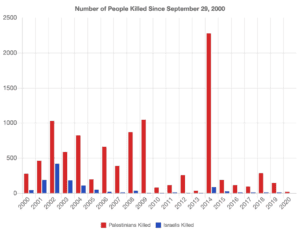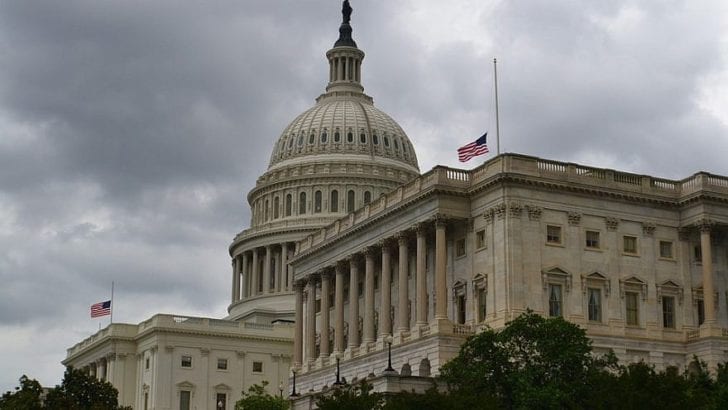At the request of Democratic leaders, President Trump ordered last week that US flags on DC federal buildings fly at half-staff “in memory of the Americans we have lost to the Coronavirus.” Justice advocates also grieve at the persistence of pro-Israel legislation in Congress.
In the chaos that is the US – with coronavirus, racial tension, deep divisions, highly contested elections – Israel continues to hold sway over Capitol Hill. Congress members toil unwaveringly to win massive military aid money and special treats for the Jewish State with 68 pieces of legislation focused on Israel.
One of them will require US taxpayers to give Israel over $10 million per day for 10 years.
by Kathryn Shihadah
Back in January 2019, immediately after the swearing-in ceremony for the new Congress, advocacy for Israel began. On that first day, the Senate introduced a pro-Israel bill; the House introduced 3. By the end of 2019, lawmakers had presented over 50 pieces of legislation favoring Israel.
2020 pro-Israel bills have been arriving at a somewhat slower pace (as of this writing, the number stands at 18), but most of last year’s bills are still in circulation. At the end of this year, every bill that has not become law will die. The process starts over with the new Congress in January 2021.
Especially given this year’s massive financial disruption from COVID-19, Americans should be aware of our country’s lavish spending habits toward Israel – and not only because we need to be generally more frugal. Israel has a long, ugly record of human rights violations, the likes of which have been chronicled in detail by numerous human rights organizations, including the Red Cross, Christian Aid, Human Rights Watch and numerous others..
[Also, keep in mind that Israel is not a U.S. ally. It has spied on the US, stolen American technology, tried to sink a US Navy ship, etc. More information on this is here.]
Below is a description of pro-Israel bills that have been introduced in Congress in 2020 (grouped by subject), followed by a listing of bills that support justice for Palestinians (as of this writing, there is only one).
For the list of 50+ pro-Israel bills (and 2 that advocate for Palestinians) presented in 2019, please go here.
Pro-Israel legislation: military aid
S.3176 – “US-Israel Security Assistance Authorization Act of 2020” (To amend the Foreign Assistance Act of 1961 and the US-Israel Strategic Partnership Act of 2014 to make improvements to certain defense and security assistance provisions and to authorize the appropriations of funds to Israel, and for other purposes).
This is the Senate version of House bill H.R.1837, which was passed last July (read about it here). The bill outlines the US promise to give Israel a minimum of $3.8 billion a year for the next ten years. In addition, it would give the President authority to provide Israel with unlimited weaponry and assistance without prior authorization from Congress.
These bills contradict the Leahy Laws, which clearly state that, in the words of principal sponsor Sen. Patrick Leahy (D-VT), “when credible evidence of human rights violations exists, US aid must stop.” (For more on the Leahy Laws, read this.)
S.3176 passed the Senate Foreign Relations Committee on May 21, using several unscrupulous procedures. As Alison Weir reports,
First, Senate Committee Chairman Jim Risch (R-Idaho) refused to allow a livestream of the meeting, despite the fact that the Senate Rules panel had recommended that extra efforts be taken to ensure public transparency while the Capitol is closed to the public and the presence of reporters is severely limited. The Senate’s Press Gallery Standing Committee of Correspondents had objected strongly to Risch’s decision.
Second, the bill was passed without being named, debated, or even discussed, even though it would set into law the largest such aid package in U.S. history. There has been no US mention of the bill by US mainstream media.
Notably, a “manager’s amendment” to S.3176 replaced the entire content of the original bill with new text – and this text was not made public until after the conclusion of the hearing.
This pro-Israel bill also provides millions in new funding for various additional programs and programs benefiting Israel. As analyst Lara Friedman reports, the bill authorizes “funding for programs designed to make enhanced/expanded US-Israel cooperation part of the DNA of more and more U.S. government agencies.” It also establishes programs “that in effect recruit U.S. agencies/funding to the cause of expanding Israel’s relations and influence in the region (i.e., open normalization by Arab states) and around the world.”
There are a number of additional perks, including requiring NASA to work with the Israeli Space Agency, despite accusations of Israeli espionage.
As the US grapples with its Covid-induced economic devastation, Israel’s $3.8 billion aid package is expected to remain intact – this even as Israel actively removes Palestinians’ protections from the virus.
Introduced Jan. 9 by Sen. Marco Rubio (R-FL). Cosponsors to date: D – 19, R – 19.
Pro-Israel legislation: Israeli-exceptionalism bills
H.R.5595 – the “Israel Anti-Boycott Act” (To impose additional prohibitions relating to foreign boycotts under Export Control Reform Act of 2018, and for other purposes).
H.R.5595 is the latest in a string of pro-Israel bills that many experts consider a violation of Americans’ right to free speech.
The bill would halt attempts to disrupt businesses that partner with illegal Israeli settlements. This same nonviolent strategy was instrumental in bringing down apartheid in South Africa.
Past anti-boycott bills have targeted businesses, organizations, and individuals; the current bill also targets global organizations – specifically the United Nations, which recently published a database of over 100 companies doing business in illegal Israeli settlements on Palestinian land. The human rights expert behind the effort “urged UN Member States to implement laws banning the import of goods produced in illegal settlements located in any occupied territory.”
The American Civil Liberties Union (ACLU) has stated unequivocally that anti-boycott legislation interferes with free speech, and is therefore unconstitutional. Nevertheless, thanks to pro-Israel influence, Congress has considered not less than 22 anti-BDS bills; 28 states have adopted anti-BDS laws (a number of these are being challenged).
President of the Foundation for Middle East Peace (FMEP) and Middle East foreign policy expert, Lara Friedman, explains that anti-BDS legislation conflates voluntary political free speech – taking a stand against Israeli policy – with a type of coercive boycott that does not resemble the BDS movement.
The Boycott, Divestment, Sanctions (BDS) movement is, in its own words,
a Palestinian-led movement for freedom, justice and equality. BDS upholds the simple principle that Palestinians are entitled to the same rights as the rest of humanity.
Israel is occupying and colonizing Palestinian land, discriminating against Palestinian citizens of Israel and denying Palestinian refugees the right to return to their homes. Inspired by the South African anti-apartheid movement, the BDS call urges action to pressure Israel to comply with international law.
(For more on BDS legislation, read this, this, and this.)
Introduced Jan. 13 by Lee Zeldin (R-NY-1). Cosponsors to date: D – 1, R – 63.
S.Res. 570 – A resolution opposing and condemning the potential prosecution of United States and Israeli nationals by the International Criminal Court.
As mentioned above, the ICC is a “court of last resort,” where it is possible to try individuals when their home country is unwilling or unable to do so. The allegations of American war crimes in Afghanistan, and Israeli war crimes in Israel/Palestine could be resolved if the US and Israel would self-investigate.
Instead of calling for due process in the home countries of the accused, however, the pro-Israel bill S.Res.570 calls for impunity – for American citizens and citizens of one other selected country.
Introduced on May 12 by Sen. Ted Cruz (R-TX). Cosponsors to date: D – 0, R – 0.
S.3775 – “The United States Israel Military Capability Act” (A bill to establish a United States-Israel Operations-Technology Working Group, and for other purposes).
The senators believe that the US government has a “national security and moral imperative” to guarantee that American soldiers’ weapons are second to none.
Foundation for Defense of Democracies (recognized as an arm of the Israel lobby) reports that the pro-Israel bill S.3775 seeks to create a “permanent and dedicated forum” for “[sharing] intelligence-informed military capabilities.”
Israel’s behavior in this regard is extremely problematic. It has a record of stealing US technology and selling it to others, including to adversaries.
Israel has also developed advanced weapons systems and sold them all over the world – including to countries known to be human rights abusers. Although the US has bankrolled Israel’s Iron Dome for nine years, when the American military wanted to purchase its own Iron Dome systems, Israel refused to provide vital source codes.
Israel has also used its advanced surveillance technology to spy on the US repeatedly in spite of the fact that the US has given Israel over $230 billion in aid since 1946.
Introduced by Sen. Gary Peters (D-MI) on May 20. Cosponsors to date: D – 0, R – 1.
S.3722 and H.R.6829 To authorize funding for a bilateral cooperative program with Israel for the development of health technologies with a focus on combating COVID-19 (over two weeks after the legislation was introduced, the text is not available).
In its letter to activists, exhorting them to contact Congress members, AIPAC proclaims, “Israel is a world leader in medical innovation, and increased U.S.-Israel collaboration will greatly benefit the American public.”
Other organizations offered a fuller perspective of Israel vis-a-vis the pandemic.
Human Rights Watch reported that the temporary disruptions Israelis are experiencing shed some light on the experience of Palestinians living under occupation:
…far more sweeping restrictions on movement have been the norm for decades. Since 2007, Israeli authorities have largely sealed off the Gaza Strip, banning the movement of 2 million Palestinians living there outside of “exceptional humanitarian cases” and maintaining a formal “policy of separation” between Gaza and the West Bank. Israel’s closure of Gaza, which is vastly disproportionate to any concrete security threat, separates thousands of Palestinians from relatives in the West Bank, inside Israel, and abroad.
Unlike the temporary COVID-19 measures to protect Israelis, these longstanding restrictions are not meant to protect Palestinians and are not going away anytime soon.
Israel has reportedly closed down Palestinian COVID-19 testing sites, continued (in one case, escalated) its nightly routine of raiding homes, arresting Palestinians – including minors – and demolishing Palestinian homes and businesses. Israeli soldiers and settlers have also allegedly been spitting on Palestinians.

Introduced by Rep. Chris Pappas (D-NH-1) on May 12, 2020 and Sen. Ted Cruz (R-TX) on May 13, 2020. Senate cosponsors to date: D – 3, R – 3; House cosponsors to date: D – 34, R – 33.
H.R.5605 – United States-Israel PTSD Collaborative Research Act (To direct the Secretary of Defense to carry out a grant program to increase cooperation on post-traumatic stress disorder research between the United States and Israel).
Israelis have indeed witnessed violence: spates of stabbings and the infamous “rain of rockets” that have sent them scrambling for shelter (for facts on Gaza rockets, read this and this).
The rocket phenomenon in Gaza began in 2001, after the Israeli military had already killed hundreds of Gazan Palestinians. In fact those “rockets” have in most cases been small, homemade projectiles – many without explosive capability – and in 19 years have caused 30 Israeli deaths. In the same time period, Israeli airstrikes have killed over 4,000 Gazan men, women, and children (this number does not include Palestinians in the West Bank, East Jerusalem, or Israel).

Overall, the death toll of Palestinians and Israelis is both tragic and lopsided: since 2000, over 10,000 Palestinians and 1,200 Israelis have been killed. Vox reports that since 2005, 23 out of every 24 conflict-related deaths have been Palestinian.
Tragically, Palestinians’ experiences would provide a more abundant field for PTSD research.
Palestine has the heartbreaking distinction of having one of the highest rates of mental illness in the world – thanks to generations of oppression. For example, 1 in 4 Palestinian adolescents have attempted suicide, according to the World Journal of Medical Sciences.
Medical Aid for Palestinians (MAP) has found that 54% of Gazan children who experienced heavy bombardment in the 2014 Israeli incursion known as Operation Protective Edge, suffer from severe PTSD, with symptoms including flashbacks and nightmares.
Palestinian psychiatrist and member of the Palestinian Ministry of Health, Dr. Samah Jabr, says of such statistics,
What is sick, the context or the person? In Palestine, we see many people whose symptoms—unusual emotional reaction or a behaviors—are a normal reaction to a pathogenic context.

One in four children in Gaza require psychosocial support.Israeli violence has made the Palestinian population a rich source for PTSD research. Palestinians have endured not stabbings, but machine guns, snipers, and tanks armed with missiles; not rains of rockets, but rains of illegal white phosphorus and one-ton bombs; not intermittent restaurant attacks, but tens of thousands of home demolitions and hundreds of thousands of detentions (including over 50,000 children since the beginning of the occupation), and the relentless cheapening and degradation of life. (For more on Palestinian and Israeli experiences of violence, read this.)
But if the US wants to study PTSD in combat veterans, a good starting place would be Breaking the Silence:
Breaking the Silence is an organization of veteran soldiers who have served in the Israeli military since the start of the Second Intifada and have taken it upon themselves to expose the Israeli public to the reality of everyday life in the Occupied Territories.
We endeavor to stimulate public debate about the price paid for a reality in which young soldiers face a civilian population on a daily basis, and are engaged in the control of that population’s everyday life. Our work aims to bring an end to the occupation.
Introduced Jan. 14 by Rep. Mike Waltz (R-FL-6). Cosponsors to date: D – 26, R – 17.
S.3409 and H.R.6392 “Secure United States Bases Act” (To modify the conditions and terms of all foreign military training programs operated within the United States by the Department of Defense and the Department of State).
These pro-Israel bills would create a new, nonimmigrant visa category for foreign military students in Department of Defense and Department of State training programs. Foreign military students would be subject to comprehensive vetting to be eligible for the visa.
The requirements would apply retroactively, but students from NATO states and Israel would be exempt.
These bills are a response to the December 2019 deadly attack at a US military facility in Florida in which a Saudi national in military training shot 11 people, killing 3.
Interestingly, while the Senate puts great faith in Israeli military students’ loyalty to the US, it is well-known that Israel has a history of spying on the US – even stealing military secrets – and was caught red-handed as recently as 2019.
In an article entitled “Israel Spies and Spies and Spies,” Philip Giraldi, former CIA counterterrorism specialist adds, “The fact is that Israel conducts espionage and influence operations against the United States more aggressively than any other ‘friendly’ country.”
Nevertheless, Israeli military trainees appear to be considered trustworthy.
Introduced March 5, 2020 by Sen. Rick Scott (R-FL), and Rep. Michael Waltz (R-FL-6). Senate cosponsors to date: D – 0, R – 1; House cosponsors to date: D – 0, R – 1.
Pro-Israel legislation: Anti-Semitism-related bills
H.Res.782 – Encouraging public schools to design and teach a curriculum about the history of anti-Semitism and the Holocaust, and the vital importance of the Jewish State of Israel.
The bill addresses the important issues of anti-Semitism and Holocaust education, but then turns a corner to once again target the peaceful Boycott, Divest, and Sanction movement (see above).
It begins with a list of recent anti-Semitic incidents and concludes with a call for all public schools to
design and teach a curriculum about the history of anti-Semitism and the Holocaust, and the historic importance of the creation of the Jewish State of Israel in 1948 that served as a refuge for Jews all over the world to escape persecution following the Holocaust.
The bill ignores the fact that the creation of Israel was accomplished through a violent, massive ethnic cleansing against the indigenous population. It also ignores the fact that projects to create other refuges had been sabotaged by pro-Israel groups.
The legislation also blames the BDS movement for “rampant anti-Semitism,” although this is broadly considered untrue. As Lara Friedman points out,
Fun fact: NONE of the attacks listed in the resolution have anything to do with Israel or BDS. Yet the drafters make the resolution about both. Another fun fact: A decade ago then-President Obama was attacked (viciously and over and over) for using language mentioning the creation of Israel and the Holocaust in adjacent sentences.

The bill does not mandate anti-BDS instruction, but leaves the content of the curriculum open to interpretation.
H.Res.837 (introduced Feb. 6 by Rep. William Keating [D-MA-9]) similarly encourages European countries to teach about the Holocaust and anti-Semitism. It does not name Israel, but does refer to “modern-day anti-Semitism,” – commonly understood as a reference to anti-Zionism, an ideology that opposes the “Jewish character of the State of Israel”
It is important to note that pro-Israel groups regularly pressure school textbook companies to present an Israel-centric version of history (read, for example, this, this, this, and this) and shut down student organizations, professors, and curriculum that represent the Palestinian perspective.
Introduced Jan. 9 by Rep. Ted Budd (R-NC-13). Cosponsors to date: D – 0; R – 5.
H.Res.837 – Reaffirming the need for transatlantic cooperation to combat anti-Semitism in Europe.
Whereas many European governments and the European Union have adopted the International Holocaust Remembrance Alliance working definition of anti-Semitism;
While the bill doesn’t report this, the IHRA working definition includes certain criticisms of Israel “antisemitic.” Thus, the resolution affirms an alleged “need” to cooperate in combatting efforts in support of Palestinian human rights.
(interestingly, in the cases of H.Res.732 and H.Res.884, bills about white supremacism and Islamophobia, the only cosponsors were Dems.)
Introduced Feb. 6 by Rep. William Keating (D-MA-9). Cosponsors to date: D – 3; R – 1.
Pro-Israel legislation: Iran-related bills
Israel has long targeted Iran as an “existential threat.” For this reason, the Israel lobby has often pushed for legislation in Congress that sanctions Iran. A separate report on Iran-related bills will be coming soon.
The single bill that is (peripherally) pro-Palestine:
H.Res.855 – “Expressing the sense of the House of Representatives that the US should ratify the Rome Statute and join the International Criminal Court.”
The International Criminal Court (ICC) is a “court of last resort” to “bring to justice the perpetrators of the worst crimes known to humankind” – crimes of genocide, war crimes, and crimes against humanity – when national courts can not or will not do so.
This resolution refers to the fact that the United States has never become a member of the ICC. Various groups and individual politicians (primarily Republican) have criticized the institution; others have denounced the critics for endorsing American exceptionalism.
Israel walks hand-in-hand with the US in defying the ICC, and has been resisting war crime investigations by the body for years.
Recently, Secretary of State Mike Pompeo vowed, “If the ICC continues down its current course [toward prosecuting Israel], we will exact consequences.”
Notably, American politicians’ and conservative think tanks’ dismiss the legitimacy of the ICC’s jurisdiction, not the factual nature of the allegations against Israel (as well as those against the US), which include crimes (committed by both Israel and the Palestinians) in the Gaza War of 2014, in the building of Israeli settlements on Palestinian land, and in the use of lethal force against peaceful protesters at the Gaza border (apartheid – of which Israel has also been accused – is also considered a crime against humanity).
Introduced Feb. 12 by Rep. Ilhan Omar (D-MN-13). Cosponsors to date: D – 0, R – 0.
Kathryn Shihadah is staff writer for If Americans Knew. She blogs at Palestine Home.
Our operations are funded solely by generous individuals like you. Your contribution will help us continue shining a light on the Israel/Palestine situation and the U.S. connection.
DONATERELATED READING:
Against Our Better Judgment: The hidden history of how the U.S. was used to create Israel
Senate Committee slips through $38 billion package to Israel
What’s in S.3176, the goodies-for-Israel bill slinking through Congress?
Israeli Spying on US, Perfecting 24/7 Surveillance Tech
Israelis Have Taken To Spitting on Palestinians During Coronavirus
The Staggering Cost of Israel to Americans: The Facts
Human rights reports on Israel-Palestine (regularly updated)
Trump-Kushner “Peace” Plan ignores elephants in the room: Israel created this mess
Congress has introduced 50 pieces of legislation about Israel in 2019
95% of Congress is ok with Israel’s torture of Palestinian children






